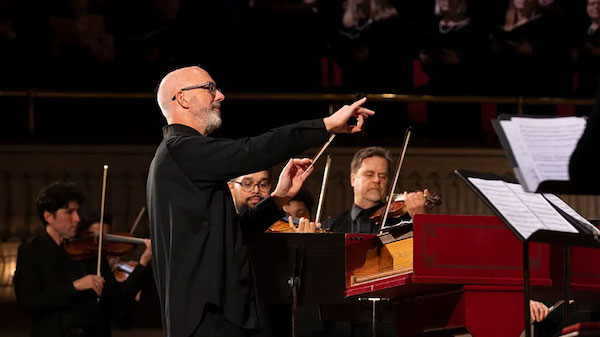Concert Review and Commentary: Music Worcester’s The Complete Bach & In Memoriam, Richard Dyer
By Jonathan Blumhofer
Music Worcester’s ambitious project, which will involve multiple Boston-area music groups, is slated to run the next eleven seasons. The goal will be to present every note the great man wrote. And a homage to the late Richard Dyer, the chief classical music critic of “The Boston Globe” for three decades.

Chris Shepard, artistic director and conductor of the Worcester Chorus, will be artistic director of the Complete Bach Project, which will be under the auspices of Music Worcester. Photo: Matt Wright
One down, 1127 to go. Music Worcester kicked off The Complete Bach, a survey of all of Johann Sebastian Bach’s music, Saturday afternoon in, of all places, a brewery – Worcester’s Redemption Rock Brewery, to be exact.
The ambitious project, which is slated to run the next eleven seasons, will present every note the great man wrote; there will be more to come on the undertaking in these pages before long. And while it may sound incongruous, Saturday’s setting was appropriate: Bach liked his beer. If the invoice from his 1713 organ-consultation trip to Halle is an accurate indication, he drank about a six-pack’s worth of the good stuff every day.
Unfortunately, Bach didn’t leave us a beer cantata. But the “Coffee” Cantata (“Schweigt stille, plaudert nicht,” BWV 211) is the next best thing and that item was the sole selection on Saturday’s program.
It was written sometime in the 1730s for a performance at the Zimmermansches Kaffeehaus, where, in the pre-concert hall days of the 18th century, Leipzig’s Collegium musicum was based. Bach directed the ensemble between 1729 and ’37 and frequently composed for it. This cantata is one of those scores, relaying the essentially comic story of the father Schlendrian and his daughter Lieschen, whose enthusiasm for the beverage drives him to distraction, though all ends more or less amicably.
Despite the aptness of Saturday’s venue, it was inevitable that a bit of detail got lost in the tavern’s background noise. Nevertheless, the vocal trio – Louise Fauteaux, Kirk Bobkowski, and Dylan Armstrong – sang strongly (in English translation) and there were lilting instrumental contributions from flautist Vanessa Holroyd and violinist Peter Sulski. The continuo of cellist Ariana Falk and harpsichordist Chris Shepard proved rock solid.
Just as memorable as the music was the menu crafted for the event, which was catered by Jollof Masters and included no less than three specially designed beverages. I only managed to sample one of the latter, but it was a doozy. The Brewery’s Doppelbach – pun firmly intended – pays homage to the Doppelbock-style beer that was first crafted during Bach’s lifetime at an abbey near Munich.
Dark but not heavy, gently sweet, with notes of caramel and toffee (I missed the advertised “hints of bread crust,” but more refined palates might not), this one proved a resoundingly pleasing discovery. Evidently, it will be on offer at upcoming Music Worcester events. If the music isn’t enticing by itself, do come for the beer; surely, Bach would approve.
I only met him once a couple of years ago after a Boston Philharmonic Orchestra concert, but Richard Dyer, who died Friday at 82, was a hard guy to avoid. As the chief classical music critic of The Boston Globe for three decades, his presence was felt across the city’s musical scene, even after he stepped down from that position in 2006. Tim Page, who wrote a beautiful obituary in The Washington Post, recounts the composer Ned Rorem – himself no slouch with a pen – once introducing Dyer with the words, “This is Richard Dyer. He runs Boston.”
That last was a bit of an exaggeration, but Dyer’s mastery of the art of music criticism was total. He set the bar, writing with insight, wit, a keen understanding of music and the business of music, as well as beautiful prose. Even today, more than fifty years after it first appeared, his assessment of a Renata Tebaldi recital at Symphony Hall remains an electrifying, entertaining read – and a necessary (as well as sadly relevant) one for any up-and-coming critic to study.
True, Dyer was occasionally a bit of an overzealous cheerleader for some of the city’s musical institutions and nobody’s judgements are flawless. But that’s the case for all of us who take up this line of work. In fact, his ears were better than most. Besides, in essentials – fairness, discernment, intelligent engagement with the art form, support for new talent, a terrific command of language – Dyer was exceptional. It’s not too much to say that musical life in Boston is far richer today because he was such a vital part of it for so long.
Jonathan Blumhofer is a composer and violist who has been active in the greater Boston area since 2004. His music has received numerous awards and been performed by various ensembles, including the American Composers Orchestra, Kiev Philharmonic, Camerata Chicago, Xanthos Ensemble, and Juventas New Music Group. Since receiving his doctorate from Boston University in 2010, Jon has taught at Clark University, Worcester Polytechnic Institute, and online for the University of Phoenix, in addition to writing music criticism for the Worcester Telegram & Gazette.
Tagged: Chris Shepard, Complete Bach Project, Music Worcester

